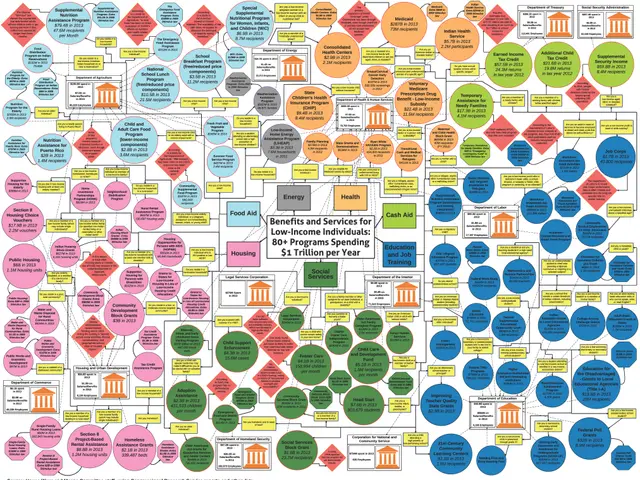This Global Giant, Ranking Among the Largest Firms Globally, Offers an Unmissable Investment Opportunity in Terms of Stock Pricing.
In the grand scheme of things, just ten corporations hold a market cap beyond the $1 trillion mark. It's a reasonable assumption that the stocks in these companies are hardly bargains, given their massive popularity and valuations. However, there's one glaring exception that might just be the steal of the century— this company saw its value dip below the trillion-dollar mark, but patient investors seeking both growth and protection in volatile markets must give it a second look.
Berkshire Hathaway Stands Out Among the $1 Trillion Giants
With a valuation of approximately $990 billion, Berkshire Hathaway (BRK.A 1.42%, BRK.B 1.11%) is well-known in investing circles. But behold, this company differentiates itself from its trillion-dollar counterparts in unique ways.
Although nearly every mega-cap entrenched in this elite club focuses on a specific sector, Berkshire Hathaway shuns reliance on any particular industry. This is thanks to its distinctive business model that no other trillion-dollar giant can replicate.
At its core, Berkshire Hathaway houses a collection of insurance companies. I know what you're thinking: insurance? Really? Well, listen up. While these insurance companies generate underwriting profit, their true value lies in something Warren Buffett termed "float." Float is simply interest-free capital serviced by insurance premiums. When an insurer accepts a premium payment, it typically sits on the money before it has to shell out for claims. In the interim, the insurer can earn interest on that cash, increasing its own revenue.
Buffett, the mastermind behind Berkshire Hathaway, has found ways to parlay this interest-free capital into growth opportunities for the company. He's invested in everything from tech and energy to transportation and consumer products. Today, the majority of Berkshire Hathaway's value does not stem from its insurance business but rather from its extensive portfolio of wholly-owned and publicly-traded securities. And did you know that many of these companies lie outside your realm of consciousness? There are banks in Latin America, drywall manufacturers, and even businesses that deal with niche markets you wouldn't dare dream of.
So why does Berkshire Hathaway stand out from its financial peers in this elite club? Because it's remarkably different, and its distinctiveness paves the way for investment opportunities during times of market turbulence.
Berkshire Hathaway: Your Ultimate Gateway to Market Diversification
The only certainty in life and the stock market is uncertainty. Nobody can say with unwavering confidence which segments will emerge victorious in the years to come. Technological giants are currently leading the charge, specifically those with a focus on AI and cloud computing.
But will these industrious titans reign victorious in 2025? There's no infallible response to that question. What's for sure? Certain sectors are experiencing growth as the market barrels down the crest of towering expectations. But history has taught us that what rises to dizzying heights can, with equal suddenness, plummet down or even tread water.
With Berkshire Hathaway, you are spared the anxieties of sector-specific hazards. Berkshire may not appear like a bargain by traditional valuation metrics, such as the price-to-book ratio. However, it's worth noting that Berkshire has never brought investors a bad return—as long as patience prevails.
The Case for Berkshire Hathaway: A Bargain Among Financial Giants
While Berkshire Hathaway may not appear like a bargain at first glance, especially by traditional valuation metrics, its long-term investment opportunities make it a steal amongst its financial peers.
Even when the market was teetering on the brink of the dot-com bubble, investing in Berkshire Hathaway proved profitable—its total return ultimately doubled that of the S&P 500[MA1] .
So, why is Berkshire Hathaway an excellent bargain among mega-cap companies?
- Diversified Businesses: Berkshire Hathaway is home to a vast catalog of businesses, an assortment that includes insurance (Geico), manufacturing, retail, and transportation (BNSF Railway). This diversity lessens the company's dependence on any one sector, rendering it more robust in varying economic conditions.
- Balance Sheet Strength: Berkshire Hathaway is distinguished by its robust financial position, with substantial indispensable cash reserves. This financial prowess enables the company to make strategic acquisitions, fund share buybacks, or invest in opportunities during economic downturns.
- Defensive Assets: Berkshire Hathaway's insurance segment, especially Geico, functions as a defensive barrier during economic downturns. The insurance arm provides steady income as it collects premiums. However, payments frequently aren't made right away when claims are lodged. Instead, this surplus is set aside for investment, offering the company additional sources of revenue.
- Cyclical Businesses: Berkshire Hathaway's cyclical enterprises, including BNSF Railway and various manufacturing ventures, are positioned to prosper during a growing economy. This dual approach—combining both cyclical and defensive strategies—situates Berkshire Hathaway well for various market circumstances.
- Value Creation: While Berkshire Hathaway's valuation may appear lofty, the company has a proven history of producing long-term value for shareholders. Berkshire Hathaway's commitment to long-term value creation, decentralized management, and financial prudence suggests that its value creation potential will extend beyond short-term market fluctuations.
- Warren Buffett's Investment Strategy: Berkshire Hathaway's recent acquisitions of smaller businesses like Occidental Petroleum, Sirius XM, and Verisign suggest that Warren Buffett's investment philosophy remains focused on value stocks, even when prices appear inflated. This suggests that Berkshire Hathaway still has intriguing prospects to explore—potential avenues for growth and returns.
- Share Buybacks: Although UBS speculates that substantial share buybacks in 2025 are unlikely due to Berkshire Hathaway's present valuation, the company has historically engaged in substantial buybacks when share prices dipped. Should valuations become more attractive, Berkshire Hathaway may soon resume its share buyback game, promoting a positive effect on shareholder value.
In conclusion, while Berkshire Hathaway's high price-to-book ratio may seem daunting, its business model diversity, financial resilience, defensive assets, and long-term value creation strategy place it among the most compelling investment options among large-cap companies.
- Despite Berkshire Hathaway's high valuation, some investors might consider it as an opportunity for diversifying their investment portfolio, given its diverse suite of businesses.
- Investors looking for both growth and protection in uncertain financial markets might find merit in investing in Berkshire Hathaway, given its resilient business model and robust financial position.








